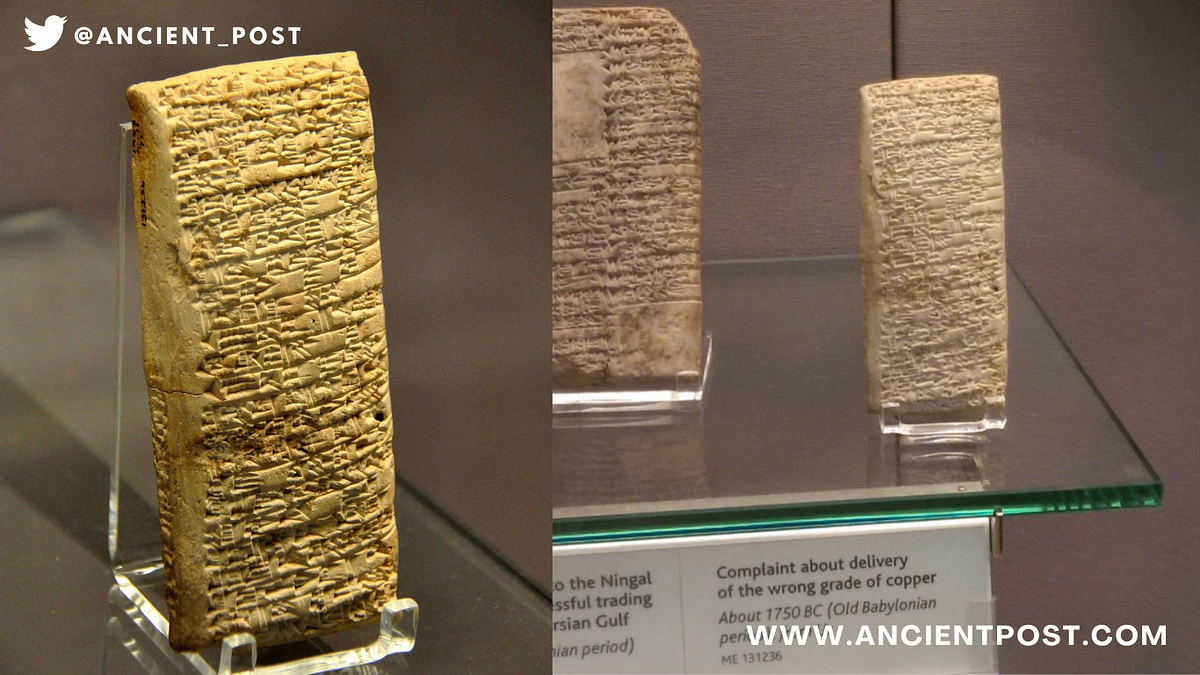Introduction
In ancient Mesopotamia, around 1750 BC, an intriguing incident unfolded, marking the first documented complaint in history. This peculiar event involved a man named Nanni and a merchant by the name of Ea-nasir. The complaint, etched onto a clay tablet, showcased Nanni’s frustration with the merchant’s delivery of the wrong grade of copper, despite Nanni having already made the payment. Adding insult to injury, Nanni expressed his dissatisfaction with Ea-nasir’s disrespectful behavior towards his servant during their encounter.

Interestingly, this complaint was not an isolated case concerning Ea-nasir. During excavations, archaeologists stumbled upon more than a dozen similar “letters” within Ea-nasir’s dwelling. It became evident that Ea-nasir had developed a notorious reputation for either failing to deliver the products that had been paid for or mistakenly dispatching them to the wrong recipients. Furthermore, whenever faced with challenges in his business ventures, Ea-nasir promptly initiated new enterprises.
These invaluable clay tablets serve as historical evidence, shedding light on early instances of consumer complaints and revealing the unethical practices prevalent among certain merchants during that era. The discovery of multiple complaint tablets offers a glimpse into the frustrations and grievances faced by customers, ultimately emphasizing the profound significance of fair trade and ethical business practices, even in ancient times.
Unveiling the Full History of Complaints in Ancient Mesopotamia
Ancient Mesopotamia, known as the “cradle of civilization,” was a remarkable civilization that flourished in the fertile lands between the Tigris and Euphrates rivers. It was here that human societies developed complex systems of governance, innovative technologies, and sophisticated trade networks. However, the discovery of these complaint tablets reveals that not all aspects of commerce during that period were marked by fairness and honesty.
The clay tablets, inscribed with cuneiform script, tell tales of frustrated customers seeking restitution for their grievances. In the case of Nanni and Ea-nasir, the complaint showcased not only the merchant’s incompetence but also his disrespectful treatment of Nanni’s servant. These documents provide a rare glimpse into the everyday challenges faced by individuals engaged in commercial transactions.
Ea-nasir’s repeated transgressions as a merchant raise questions about the prevailing business practices of the time. The tablets reveal a pattern of deceit, negligence, and a lack of accountability that would resonate with modern consumers. It is evident that customers, even in ancient Mesopotamia, were keenly aware of their rights and were not hesitant to voice their dissatisfaction when they felt wronged.
Ethics and Fair Trade in Ancient Times
The discovery of these complaint tablets underscores the enduring importance of ethical conduct and fair trade practices in commerce. Despite the vast temporal gap between ancient Mesopotamia and the present day, the principles of honesty, transparency, and respect for customers remain as relevant now as they were back then.
The lessons derived from these ancient complaints serve as a timeless reminder that businesses must prioritize customer satisfaction and adhere to ethical standards. In an era where online shopping and e-commerce dominate, these fundamental principles become even more critical. Customers today have a multitude of options at their disposal, making it imperative for businesses to prioritize their needs and consistently deliver on their promises.
